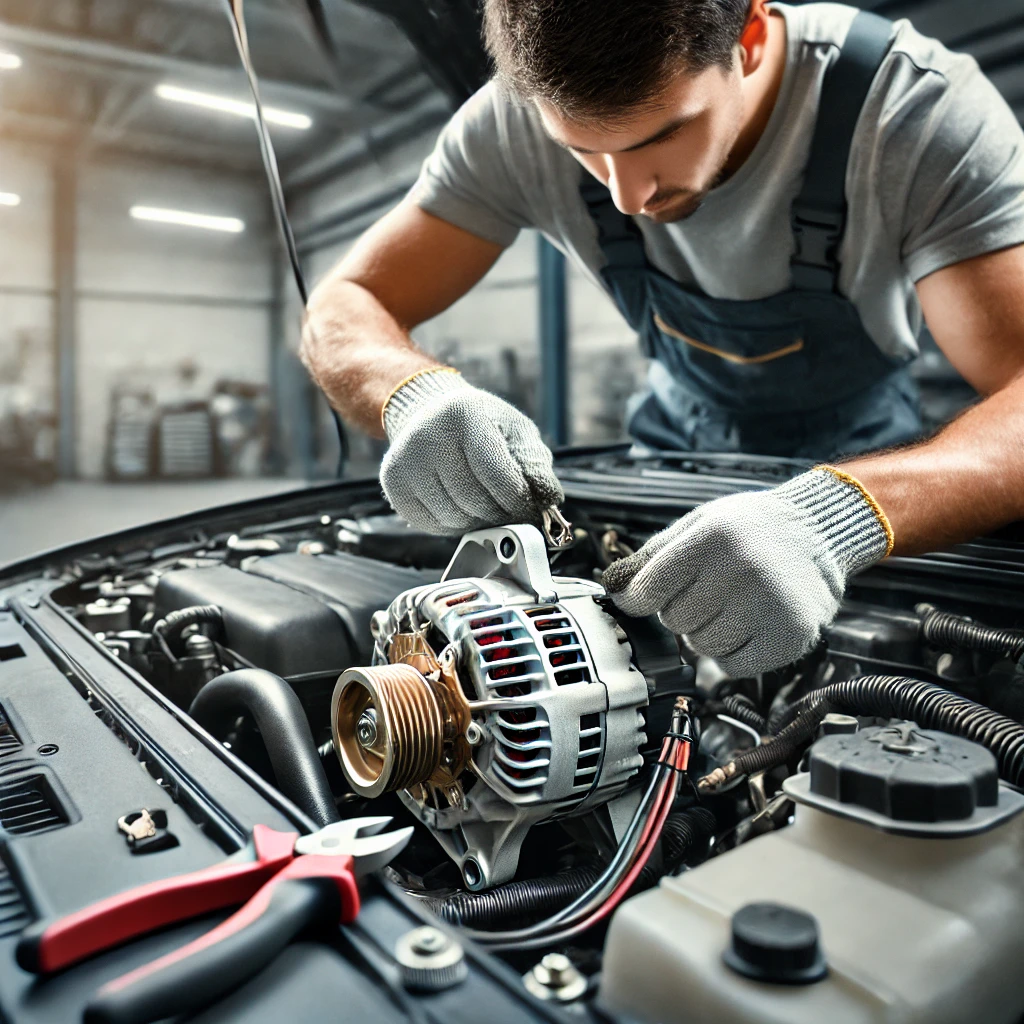Your car’s alternator might not get the attention it deserves, but it’s a critical component that keeps your vehicle running smoothly. Imagine driving down a dark road, headlights blazing, radio playing your favorite song, and the air conditioning keeping you cool—all of this is possible because of the alternator. It’s the powerhouse behind your car’s electrical system, tirelessly generating electricity to charge the battery and power every electrical component. In this article, we’ll take a deep dive into what an alternator does, why it’s so vital, and what happens when it fails, giving you a solid foundation for understanding alternator replacement.
What Exactly Is an Alternator?
At its core, an alternator is a small generator attached to your vehicle’s engine. It converts mechanical energy—produced by the engine spinning a belt—into electrical energy. This process begins when the engine turns the serpentine belt, which spins the alternator’s pulley. Inside the alternator, a rotor spins within a stator (a stationary set of coils), creating an alternating current (AC). This AC is then transformed into direct current (DC) by the alternator’s rectifier, making it usable for your car’s battery and electrical systems.
Picture the alternator as the heart of your car’s electrical circulation. While the battery acts as a temporary reservoir, providing power to start the engine and run accessories when the car is off, the alternator takes over once the engine fires up. It ensures a steady flow of electricity, keeping everything from your headlights to your windshield wipers operational.
The Alternator’s Role in Your Vehicle
The alternator doesn’t just keep the lights on—it’s responsible for powering a wide array of systems:
- Lighting: Headlights, taillights, and interior lights rely on the alternator for consistent power.
- Ignition System: The spark plugs that keep your engine running need electricity, which the alternator supplies.
- Climate Control: Your air conditioning and heating systems draw significant power, especially in extreme weather.
- Infotainment: From the radio to touchscreen displays and GPS, modern cars depend on the alternator to keep these features alive.
- Accessories: Power windows, seats, and mirrors all tap into the alternator’s output.
Beyond powering these components, the alternator recharges the battery after each start. Without it, the battery would drain within minutes, leaving you stranded. According to automotive experts, a typical car battery can only power electrical systems for about 20-30 minutes without the alternator’s support—hardly enough for a long drive.
Why the Alternator Matters More Than Ever
Modern vehicles are more electrically demanding than their predecessors. In the 1970s, a car might have had a simple radio and basic lighting, requiring an alternator with a modest 40-60 amp output. Today, with advanced driver-assistance systems (ADAS), electric power steering, and high-wattage sound systems, alternators often need to produce 100-150 amps or more. This increased demand means a failing alternator can wreak havoc faster and more extensively than in older models.
For example, consider a scenario where you’re driving a 2023 SUV with adaptive headlights, a rearview camera, and a premium audio system. If the alternator starts to falter, you might notice the headlights dimming, the camera glitching, and the sound cutting out—all at once. This interconnected reliance underscores why keeping your alternator in top shape is non-negotiable.
Recognizing Alternator Trouble
Alternators don’t fail silently—they send out distress signals if you know where to look. Here are the key signs:
- Dimming or Flickering Lights: If your headlights dim at idle but brighten when you rev the engine, the alternator might not be producing steady power.
- Dashboard Warning Lights: A battery-shaped icon or “ALT” light on your dashboard is a direct alert from your car’s computer about charging issues.
- Odd Noises: Grinding or whining from the engine bay could mean worn alternator bearings, a precursor to failure.
- Electrical Glitches: Slow power windows, a fading radio, or erratic gauges suggest the alternator isn’t keeping up with demand.
- Dead Battery: If your battery dies repeatedly despite being new, the alternator might not be charging it.
- Stalling Engine: In extreme cases, a failing alternator cuts power to the ignition, stopping the engine dead.
Take a real-world example: Sarah, a busy mom, noticed her minivan’s interior lights flickering during school drop-offs. She ignored it, assuming it was a minor glitch. One evening, the van wouldn’t start after a grocery run—the alternator had failed, draining the battery completely. A quick check earlier could have saved her the tow bill and headache.
When Replacement Becomes Necessary
If you spot these signs, don’t delay. A simple test with a multimeter can confirm the alternator’s health—look for an output of 13.5 to 14.5 volts at idle. Anything lower or erratic suggests it’s time for a replacement. Ignoring the problem risks not just a dead battery but potential damage to sensitive electronics, like the car’s computer or navigation system.
The Bigger Picture
The alternator’s importance extends beyond convenience—it’s a safety issue. Dim headlights reduce visibility, a stalled engine can strand you in traffic, and a dead battery might leave you without hazard lights in an emergency. Regular checks and timely replacement can prevent these scenarios, keeping you and your passengers safe.
Conclusion
The alternator is the backbone of your vehicle’s electrical system, quietly powering everything from your lights to your engine’s ignition. Understanding its role and recognizing failure signs empowers you to act before a small issue becomes a major problem. Whether you’re a daily commuter or a weekend road-tripper, keeping your alternator in check ensures your car stays reliable. If you suspect trouble, test it or consult a mechanic—your vehicle’s health depends on it.

